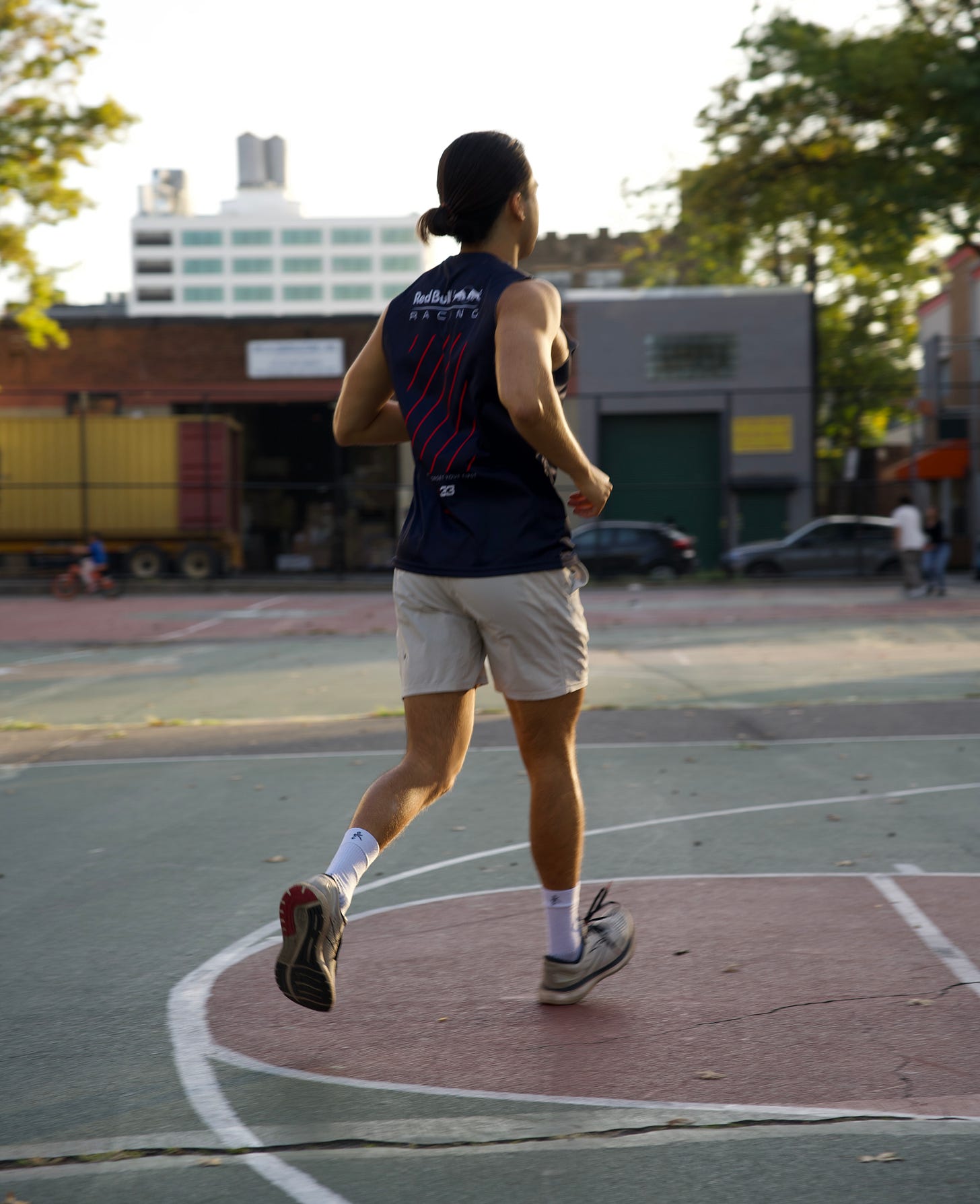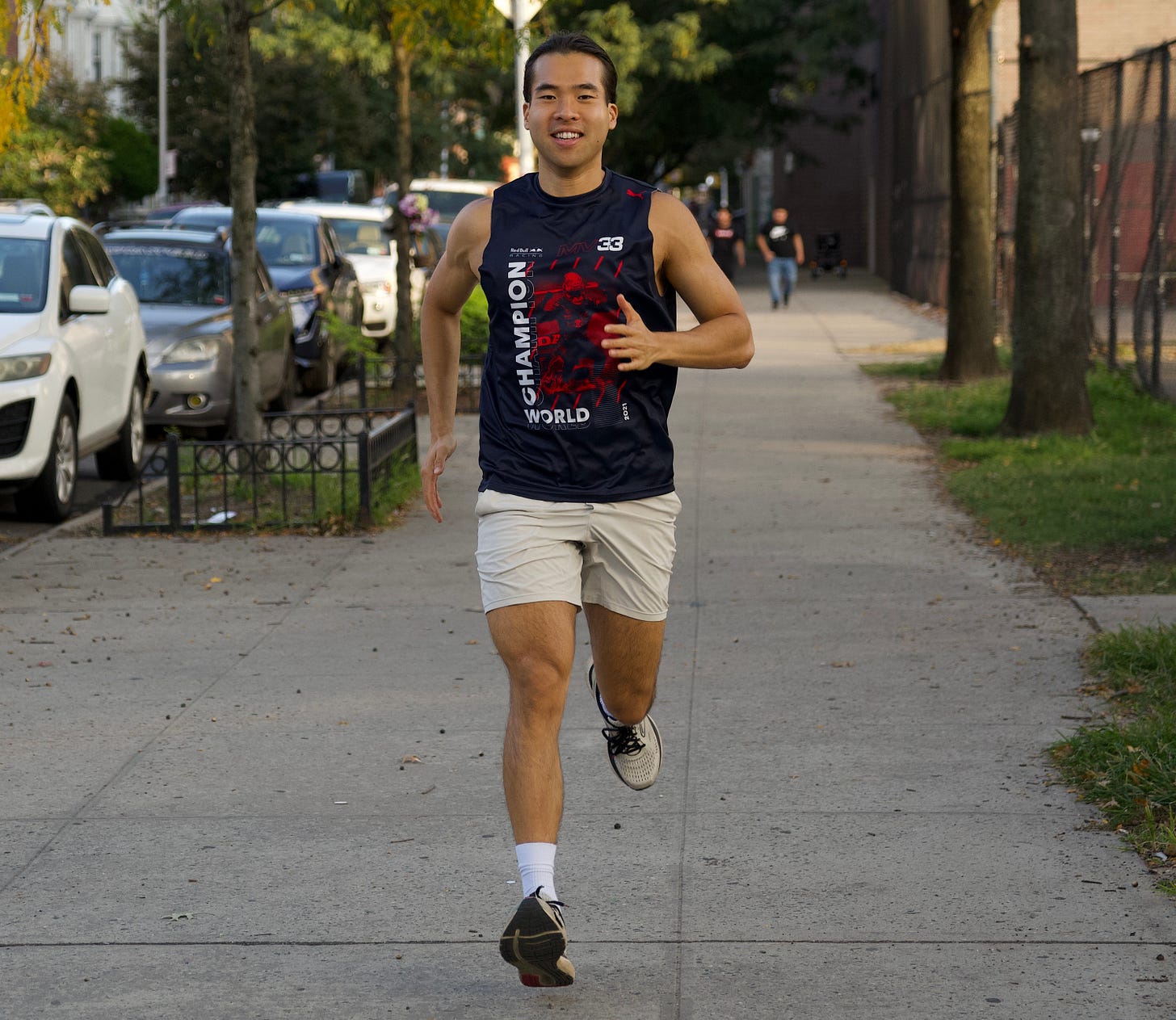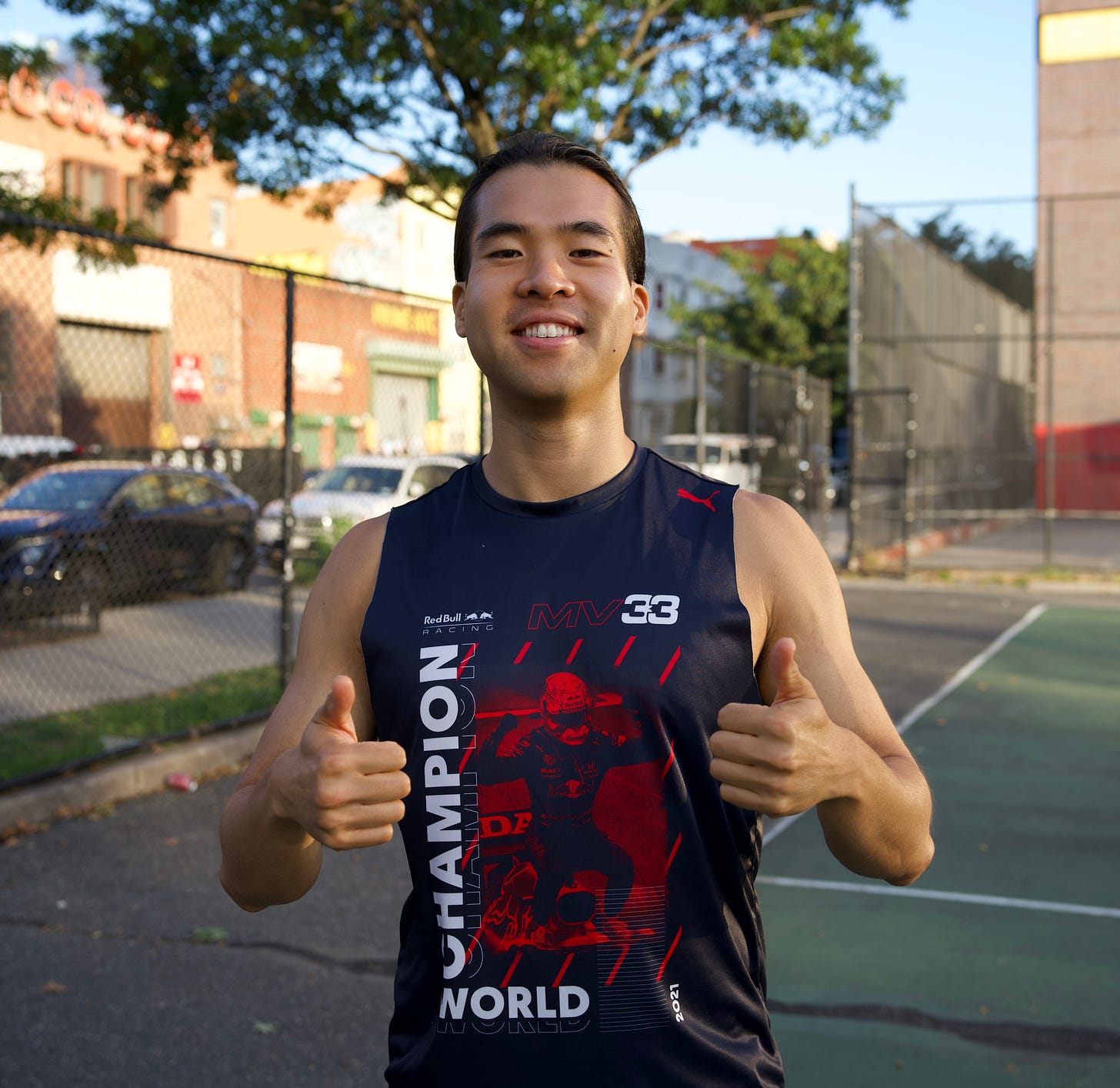#45: Simple, Hard, Enjoyable - The 3 Ingredients to Earned Success🏃🏻♂️
3 weeks out from the NYC Marathon
This blog is about my experience training for the NYC Marathon. A big shoutout to all my friends who have already contributed to my fundraiser for autism research 🙏. If you haven’t had a chance to donate yet, you can learn more at the end of this blog. Every dollar is appreciated 😊.
On Saturday, I ran 22 miles. I started from Sunset Park in Brooklyn which is where I call home now. It also happens to be mile 4 of the NYC Marathon. After my dynamic warm-up routine at the gym, I proceeded to trace the remaining 22 miles to become familiar with the physical hills and mental hurdles that will inevitably emerge on race day.
I’ve never altered my training schedule due to weather because good weather is not guaranteed on November 5th. For some reason, it’s rained almost every weekend here for the last couple of months and Saturday was no exception. It was raining hard enough that my toes became wet a few miles in, but light enough that I still listened to podcasts with my AirPods. When the Strava app announced 22 miles completed in my ears, my fingers were so numb that I was texting in slow-motion. I sought refuge in the Whole Foods at Columbus Circle before heading home.
This was my last long run of this training block. I’ve devoted the past 11 weeks to incrementally running more miles. On July 27th, I was jogging with my friend Jason when the idea of running a marathon was first seeded. At the time, I was thinking about running a half-marathon, but wasn’t committed. With a 100-mile ultramarathon and full Ironman under his belt, Jason told me that I should just run the entire thing. Admittedly, at first I didn’t take his encouragement seriously because Jason tends to charge at things with less reservation than me. When we climbed snowy Mt. Huron (14,012′) in October 2020, he did it in shorts and was also quite hungover. There were six of us, so on the two-hour drive from Denver to the trailhead, Jason volunteered to lay in the trunk while eating his leftover burrito from the night before. Although that initial conversation we had by the West Side Highway was met with skepticism, it set in motion a series of “Why not me?” self-inquiries. I’ve always known I would run a marathon someday, so maybe this was the nudge that I needed all along.
False Start
This will be my first race that’s longer than a 5K, but I’ve actually been in a marathon before. I ran the last 4 miles of last year’s NYC Marathon. I didn’t set out to sneak into the marathon and I actually didn’t even know the marathon was that day. Originally, my plan was to run in Central Park, but when I emerged out of the subway, every street was either blocked off or too crowded to move through. I grew more frustrated, but also more curious. Eventually, the barricades were gone and I was able to start running. It was already the afternoon and I was running on fresh legs, so I passed the remaining runners fairly easily. Streams of spectators were on either side with cheers, signs, and baked goods. It felt strange knowing that these strangers were cheering for everyone but me. I crossed the finish line and noticed the absence of any strong emotion. Other runners were laughing and crying, but I felt nothing. While I’m not particularly proud of sneaking into the last four miles, I also don’t think I did any harm. There was plenty of room by then and I didn’t take anything from the aid stations. Ethical implications aside, it’s interesting how much difference doing the actual thing makes. There’s only symbolism in the medal, draping of the post-race poncho, and congratulatory hugs if you actually earn it.
Earned Success
Earning it, in this case, is the triumph of running a marathon, but can be expanded broadly to success. Implicitly we already understand what earned success is, but its meaning can vary depending on who you ask. That’s by design. It’s a nebulous term to grasp, but at least we already know what it isn’t. No one likes the kid in the group project who doesn’t contribute. Lottery winners return to baseline levels of happiness after an initial spike. Cutting corners when your gym teacher forced you to run the mile in elementary school felt icky. Okay — maybe the last one was just me.
Earned success is the belief that you’ve created value in your life and in the lives of other people. Creating value is just another way to say feeling useful. Usefulness is not just about the end product. Having agency over what you set out to accomplish is just as important. Getting what you want is hard though. It requires first knowing who you are and then actually doing what you said you’re going to do. For me, that means running whatever milage is being prescribed by the first Google result from “how to run a marathon”.
If “happiness is not something that you can find, acquire, or achieve directly”, then creating the conditions for happiness to emerge is the next best alternative to strive for. The times in my life when I’ve been the happiest have also been when I was highly motivated. Another way of saying being motivated is having life energy. Inversely, depression is the absence of life energy. Without motivation, it can be a struggle to even get out of bed. But when you’re stoked, the discomfort of waking up early and the drudgery of putting one foot in front of the other for 33,000 steps (I checked Strava) becomes more tolerable. If being motivated is the opposite of being depressed, how might we seek out higher levels of motivation? Or if we’re already motivated, how can we sustain it?
Simple, Hard, Enjoyable
I think the key to generating momentum in motivation is to do things that are simple, hard, and enjoyable. Simple things have been stripped down to their essence. They are core to the objective. For running a business, it means talking to customers. For running a marathon, it means going for runs. The opposite of simple is complicated, rather than complex. Complicated things can be simplified by removing unnecessary parts or reducing to only the essential elements. It’s simple because we already know it’s important.
Optimal performance occurs when things are not easy, but also not excruciatingly difficult. The Yerkes-Dodson law shows that peak performance occurs at moderate levels of stress. Flow, the feeling of being totally immersed in the present activity, only emerges in this sweet spot. Hard doesn’t have to mean not fun. In outdoor sports, it’s known as Type II Fun. If it was too easy, it wouldn’t be fun anymore. There’s a reason why runner’s high only happens when we’re pushing ourselves.
Earned success only matters if it’s enjoyable. Good things take time so why not enjoy the ride? Discipline can only take you so far. However, enjoyable must be defined on your own terms. I, like everyone, enjoy warm cookies and milk. But I also enjoy long, slow runs where my mind is free to wander the caverns of unexplored curiosities. I’ve even learned to enjoy running in the rain. While on a 13-mile run with my friend Joe, the sky erupted and buckets of precipitation began to fall. Instead of calling it early or buying rain ponchos at the bodega, we took off our shirts and kept going with glee. Just like little boys with yellow boots stomping in puddles.
Simple, hard, enjoyable. The holy trinity of earned success. With just two out of three, things start to get a bit shaky. Simple and hard, but not enjoyable is simply no fun. If it’s simple and easy, then everyone is going to do it. Hard and enjoyable is a nice place to play in, but if it’s complicated then you’ll forever be pulled in different directions by distractions. Finding things that’re simple, hard, and enjoyable is the secret recipe to stay in the game long enough to achieve earned success. At some point, it becomes inevitable.
Support Me by Supporting Others
I tend to do things out of order and this was no exception. First, I started training for a marathon; then I decided to run the NYC Marathon. The only problem was that there were no spots left. Securing a spot via lottery, qualifying with time, or the 9+1 program were all out of reach. I was determined to run, so out of sheer desperation, I reached out to every single charity partner. Not only were they all out of spots, but their waitlists were also completely full. It took me a couple hours to manually type over 40 individual emails asking for an extra spot, but I figured it was worth a shot. I started to lose hope after not hearing back from anyone for a few days, but miraculously, Organization for Autism Research got back to me with only two days left.
Since securing a spot and committing to raise $3,000 for OAR, I’ve obviously been running a lot, but I’ve also been spending time to understand what it means to live with autism. From talking to the founder of a digital autism care startup and my neurodivergent friends, I’ve learned about the various misconceptions around autism and how OAR’s mission of funding research can help.
In addition to the $300 marathon registration fee, I’ve also donated the first $250 to OAR. I hope join me and contribute to the fundraiser! I truly appreciate every donation 🙏.
P.S. Running is an individual sport, but I’ve been fortunate enough to be supported by some great friends. Thanks to Joe for taking pics for me and keeping my long run pace properly restrained with great banter. Thanks to Cissy for putting me onto dried dates and inviting me on her 16-mile run when I could barely run 8. Thanks to Jason for encouraging me to just skip the half and go straight to the full thing at a time when I had never even ran 6 miles.






Thanks for sharing! Love the three words, which reminds me another three words from Derek Sivers "Happy, Smart, and Useful" https://sive.rs/hsu
Let’s gooo. Team dried dates🤝